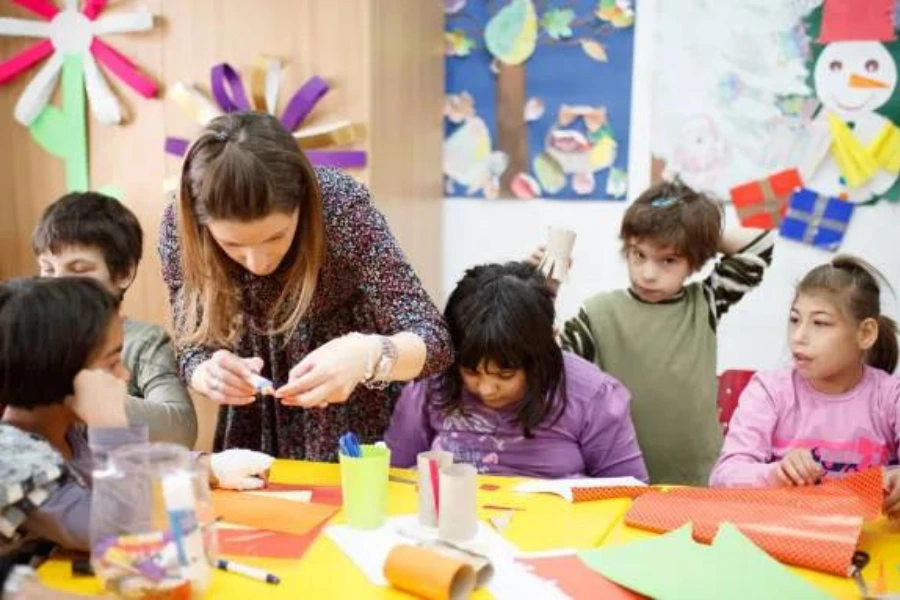
Inclusivity is a new term that has gained immense relevance and significance in the current mainstream educational setup. Building an atmosphere that gives every child the security to express themselves without fear of being judged is what inclusivity means. Being completely engaged in all important classroom activities in a manner that suits every child’s preference is Inclusion.
Societies, communities, and Educational Forums are making an impactful change by designing their classrooms to be inclusive and involve maximum participation from children who may be secluded due to their diverse learning needs.
Understanding Inclusivity Meaning gives a clear picture of how to design a learning space that celebrates the diversities of children, giving every child a fair chance to succeed.
Making Sense of Inclusivity
Inclusivity is a belief that fosters a spirit of empathy and positivity, highlighting how institutions can do their best to make the system function best for the upliftment of children with special needs.
Inclusivity implies education for all in a manner that suits their learning style, and the child does not have to step out of their comfort zone. Making sense of inclusivity depends upon the crucial attributes of values, voices, and vision.
To download the brochure of the SEN Course, Click Here!
For more details on the SEN Course, Call/WhatsApp at +919321024137 / +919869866277
Values
Inclusivity is based on the principles that give weightage to equality, self-esteem, and respecting every single individual.
- Equity over sameness
- Respect for differences
- Commitment to justice
Voices
The assurance that every single voice is heard, given due importance is essential for implementing True inclusivity.
- Representation matters
- Active listening
- Empowerment
Vision
Inclusivity is not static; it grows from a vision that guides consistent and intentional action.
- Inclusive goals
- Long-term planning
- Shared responsibility
By focusing on values, amplifying voices, and building a shared vision, inclusivity becomes a practical, lived experience rather than a distant best. When inclusion is practiced with intent, it fosters environments where all individuals can participate, contribute and succeed.
To download the brochure of the SEN Course, Click Here!
For more details on the SEN Course, Call/WhatsApp at +919321024137 / +919869866277

Why Inclusivity Matters?
We are living in a world that is evolving, and the more we move on to accepting a modern approach there has been a rising trend of cases of learning disabilities owing to changing lifestyles. So it becomes imperative to design surroundings that are inclusive enabling special children to access the places physically and gain knowledge as per their learning preference.
Inclusivity matters as it is the only approach that helps to accommodate all children under one platform, building strong partnerships and successful futures for children where they are financially and intellectually independent.
Key Reasons Why Inclusivity Matters:
Fosters Oneness
When people are valued and are not judged, they get involved positively, feeling a sense of belonging in their immediate environment.
Celebrates diversities
Inclusivity celebrates diverse attributes of children, where they learn each one’s unique qualities and how these qualities can enhance creativity and decision-making.
Builds strong partnerships
Inclusion helps to bring educators, parents, and the school management together to work for the holistic progress of the child, fostering teamwork and strong bonds.
Strengthens Social Justice
It maintains and corrects the imbalance that has been perpetrated over the years, discouraging better participation from all individuals.
Boosts Personal Growth
People immediately develop empathy, respect, and understanding when they grow in an inclusive setting.
Supports Long-Term Success
Institutions that promote and practice inclusion are more sustainable in the long term.
Inclusivity gives priority to the people around. It is learner-oriented, where education is offered in a manner that aligns with the child’s preference, and the pace at which the child learns is not compromised.

Breaking down What it Truly Means to be Inclusive in Today’s World
Being inclusive in today’s world is a challenging task that involves maneuvering the overall development of the child, which is not just restricted to the academics of child. It means to curate a space thoughtfully that gives every chance to be themselves, shunning any masks that children put on just to fit in a learning space.
It runs deep into changing the mindsets of communities and society that respect the uniqueness of every child and promote their heartfelt engagement in all activities.
What It Truly Means to Be Inclusive:
Identifying their uniqueness
Inclusion starts with the fundamental principle that everyone is unique and comes from varying backgrounds and cultures.
Promote equality
Making sure that there is fair access to learning opportunities and that every child gets the desired academic support and guidance.
Eradicating judgmental bias
Inclusion involves spreading awareness and getting rid of any unjustified bias or false beliefs that lead to excluding others.
Promoting Representation
Giving children special opportunities to acquire leadership roles and represent them in crucial roles.
Real-World Application of Inclusivity:
In Education
Teachers incorporate a variety of teaching techniques to assist children with multi-modal forms.
In Workplaces
Companies make special amendments to ensure the workplaces are physically accessible and are comfortable to work in.
In Communities
Public spaces are designed to be accessible to people with disabilities, and events are planned with diverse cultural practices in mind.
In Media
Special representation in stories and media houses where there are stories created reflecting different races and life experiences.
True inclusion is an approach that endeavors to bridge any gaps that discourage children from being an active part of mainstream education.
When inclusion is dealt with serenity, it helps the society to transform into a conducive, happy learning space.
To download the brochure of the SEN Course, Click Here!
For more details on the SEN Course, Call/WhatsApp at +919321024137 / +919869866277

Source: istockphoto
A Closer Look at the Principles and Power of Inclusivity
The wave of inclusion has swept across the country, giving impetus to better learning opportunities and promoting the approach to interact meaningfully and respect each other within organizations and society at large.
Inclusion has the power to bring together individuals from varying walks of life to come together on the core values of equity and respect. It destroys any negativity that excludes any individual from being a part of the mainstream classroom, only due to their diverse learning needs.
Creating a nurturing learning space that is beneficial for all children, that promotes equality and breeds a positive ground for providing every child equal opportunity for success is the main motto of Inclusivity.
Core Principles of Inclusivity:
Equity Over Equality
Inclusivity aims to offer customized support to children that targets their real areas of concern, helping the child handle their struggles independently.
Belonging for All
Inclusive spaces focus on creating emotional and social safety, where every individual feels accepted.
Active Participation
Everyone’s opinions and thoughts are respected and asked for.
Accessibility in Design
Systems, tools, and spaces are structured to include people with varying abilities.
The Special Education Needs Course offered by Vidhyanidhi Education Society (Govt. Regd.) reflects these principles by preparing teachers with the knowledge and skills required to support inclusive practices in real-world settings.
The Conceptual Importance of Inclusivity:
Shifts Mindsets
Inclusivity challenges outdated rules and encourages people to think in more kindhearted, flexible ways.
Builds Stronger Values
It nurtures respect, empathy, and fairness at the initial level of education, work, and society.
Promotes Social Justice
It identifies historic rejections and promotes equity through informed practices and policies.
The Special Education Needs Course prepares students with a strong theoretical understanding of how inclusivity shapes educational frameworks and improves learning results.
The Practical Importance of Inclusivity:
In Classrooms
Teachers adapt lessons, tools, and assessments to suit diverse students.
In Workplaces
Employers promote inclusive hiring and create accessible environments for all employees.
In Society
Every citizen has a choice of public services, medical care, and transportation thanks to inclusive policies.
These practical applications are further promoted in the Vidhyanidhi Education Society’s (Govt. Regd.) Special Education Needs Course, which helps teachers connect theory to practical methods.
Power of Training in Inclusivity:
Through the Special Education Needs Course, participants gain practical experience in:
- Developing Individualized Education Plans (IEPs)
- Using assistive technologies
- Building inclusive classroom environments
- Promoting collaboration with families and specialists
The Special Education Needs Course by Vidhyanidhi Education Society (Govt. Regd.) plays an important role in empowering teachers to lead with empathy and effectiveness. By supporting principles with action, inclusivity becomes a powerful tool for transforming not just classrooms, but complete communities.
Elevate your teaching skills with Vidhyanidhi Education Society’s SEN Course today!
To download the brochure of the SEN Course, Click Here!
For more details on the SEN Course, Call/WhatsApp at +919321024137 / +919869866277
FAQs
Can Inclusivity exist without diversity?
Inclusivity without diversity lacks meaning—it needs varied identities to include and support for true impact.
Why is Inclusivity important in the workplace, schools, and communities?
Inclusivity fosters equality, especially in giving every individual a chance to participate in all programs and build a successful life filled with financial independence.
What are the Basics of Inclusion?
Respect, equal access, active participation, and support for all—values taught in Vidhyanidhi Education Society’s Special Education Needs Course.



